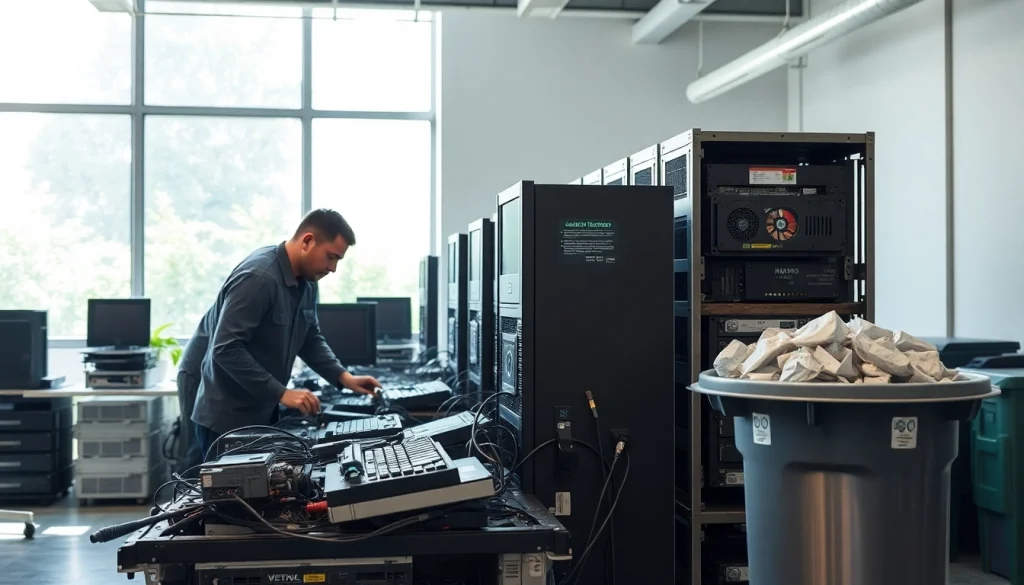Understanding the Importance of Computer Recycling in Reading
In a rapidly advancing technological world, the need for responsible electronic waste management has become critical. With an ever-increasing number of devices being disposed of, understanding the importance of computer recycling reading is essential for both environmental sustainability and data security. E-waste contains valuable resources that can be recovered and reused, minimizing the demand for new raw materials and reducing the carbon footprint associated with manufacturing. This article explores the various facets of computer recycling, including environmental benefits, common misconceptions, and practical recycling methods available in Reading.
What is Computer Recycling?
Computer recycling involves processing old or unwanted computers to recover valuable components and materials. This process not only helps mitigate the environmental impact of e-waste but also promotes the reuse of working parts, significantly reducing landfill waste. Recycling can involve various methodologies, such as refurbishing still-functional devices, extracting premium materials like metals and plastics, and even recovering precious metals from circuit boards.
Environmental Benefits of Computer Recycling in Reading
The environmental advantages of computer recycling are vast:
- Reduction of Landfill Waste: Recycling keeps computers out of landfills, where they can take decades to decompose while releasing harmful substances into the soil and groundwater.
- Conservation of Resources: Recycling recovers materials such as aluminum, copper, and plastics, reducing the need for raw material extraction and preserving natural resources.
- Energy Savings: Recycling processes require significantly less energy compared to producing new materials, thus reducing greenhouse gas emissions.
- Encouragement of Sustainable Practices: Engaging the community in recycling initiatives promotes environmental responsibility and awareness about the dangers of e-waste.
Common Misconceptions About E-Waste
Despite the growing urgency around e-waste recycling, several misconceptions persist:
- Misconception 1: “All electronic devices are recyclable.” In truth, not all e-waste can be recycled. Some items, particularly those containing hazardous materials, need specialized handling.
- Misconception 2: “Recycling is inconvenient.” With numerous local recycling options and events, recycling can be made easy and accessible to all.
- Misconception 3: “Data is always secure after recycling.” It’s crucial for individuals and businesses to understand the importance of proper data wiping before recycling.
How to Effectively Recycle Your Computers in Reading
Identifying Acceptable E-Waste Items
One of the first steps in responsible computer recycling is identifying which items can be recycled. Common recyclable electronics include:
- Desktops and laptops
- Monitors and displays
- Keyboards and mice
- Printers and scanners
- Storage devices like hard drives
- Mobile phones and tablets
Finding Local Recycling Centers
Finding a nearby recycling center is crucial for proper e-waste disposal. In Reading, numerous local organizations and municipal services offer computer recycling programs. It is advisable to check for certified e-waste recycling facilities to ensure compliance with environmental standards. The Recycling Association and local government websites can provide detailed information on sites that accept e-waste.
Preparing Your Computer for Recycling
Before recycling, proper preparation is necessary to protect personal data:
- Backup Your Data: Save important files to an external hard drive or cloud storage.
- Erase Your Hard Drive: Utilize software designed to overwrite the hard drive multiple times, making recovery impossible.
- Remove Non-Recyclable Parts: Take out any batteries or non-metal components as instructed by your local recycling center.
Best Practices for Business E-Waste Disposal
Creating a Company E-Waste Policy
Organizations should formalize their e-waste disposal strategies by creating and implementing an effective e-waste policy. This policy should outline:
- Schedule for regular audits of electronic equipment
- Procedures for safe storage and disposal of e-waste
- Employee training on e-waste recycling
Data Security Considerations
Data security is paramount in the e-waste disposal process. Businesses must ensure that all confidential information is securely erased from devices before they are recycled to prevent data breaches. Many recycling organizations offer certified data destruction services, providing businesses with peace of mind.
Responsible Disposal of Old Equipment
Old equipment should be disposed of responsibly, ensuring that it is channeled through proper recycling and disposal networks. In addition to recycling, consider donating or selling functional items to extend their life and minimize waste.
Community Initiatives for Computer Recycling in Reading
Upcoming Recycling Events in the Area
Reading hosts various community events aimed at increasing awareness of e-waste problems and promoting recycling. Local government and non-profits regularly schedule e-waste collection days where residents can drop off unwanted electronics for recycling at no charge.
Partnering with Local Organizations
Collaboration with local environmental groups and organizations can enhance recycling efforts. Schools, businesses, and organizations can partner to host educational workshops and recycling drives, fostering a culture of sustainability within the community.
Raising Awareness About E-Waste
Community awareness campaigns serve to inform residents about the hazards of improper e-waste disposal and the benefits of recycling. Utilizing social media, local events, and workshops can drive home the importance of responsible e-waste management.
FAQs About Computer Recycling in Reading
Where can I recycle my old computer in Reading?
You can recycle your old computer at various certified e-waste recycling centers and community recycling events in Reading. Check local government websites for a list of acceptable drop-off locations.
Are there any costs associated with recycling computers?
Many recycling centers offer free disposal services for personal electronics. However, some specialized recycling may incur charges, so it’s best to verify with the facility before proceeding.
What happens to my data when I recycle my computer?
To ensure security, it’s crucial to wipe your hard drive before recycling. Many facilities offer certified data destruction services to ensure your data is unrecoverable.
How often does e-waste recycling occur in Reading?
Recycling events in Reading may happen quarterly or at scheduled times throughout the year. Local authorities typically announce these events, so it’s advisable to keep an eye on community boards and websites.
Can I recycle non-working computers?
Yes, non-working computers can be recycled. Many e-waste facilities accept broken devices and will recycle them by recovering usable components or materials.
